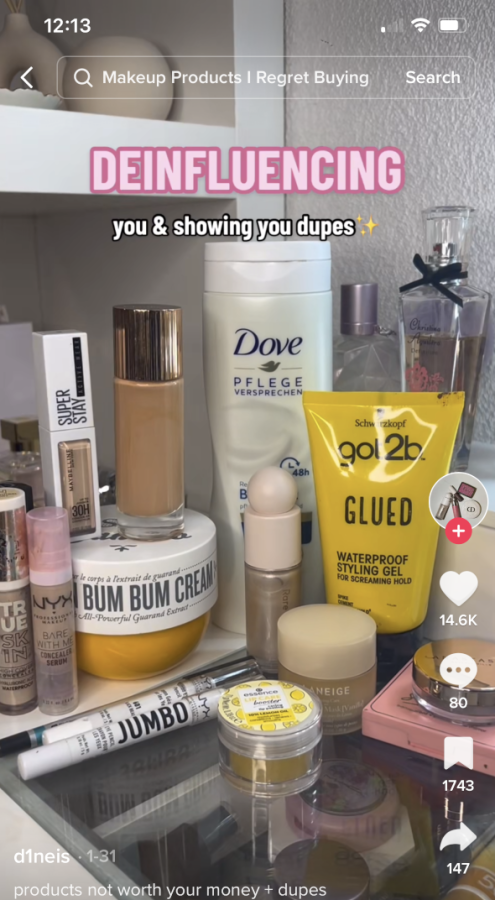Overconsumption leads to #deinfluencing
Overconsumption by definition is when a consumer over purchases and uses their available products and goods to the point they cannot be replenished or reused. With trends coming and going and influencers desperate to keep up, overconsumption is quickly becoming a major problem.
With brand new products being dropped every day, the social media reviews are influencing millions of watchers to splurge and try the hottest new thing. Tiktok is becoming the biggest platform to spread overconsumption.
Tiktok specifically, although most social media do this as well, surrounds people’s feeds to match what they like and what they’re watching. Because of this algorithm, consumers are shown exactly what they want to see. When one beauty product becomes viral it starts a chain of videos and influencers gain more followers from their reviews which are reaching more and more people.
To maintain their audience,creators have to keep trying and reviewing new products constantly. Part of the reason these influencers have such an impact is because the people they are influencing truly trust their opinion. The viewers, often persuadable teens, feel like the people they are watching are giving true and honest opinions. While some are reviewing products, almost all the rest are ad deals. These videos are being created to make the companies product the best and most desirable. when in reality this expensive product is, if anything, average.
On top of creators buying products for their own videos. Businesses are sending a crazy amount of products to mass amount of people. In addition to ads, so many businesses are desperately depending on these influencers as advertisements.
While social media has been a game-changer for spreading makeup and skincare products, only a couple of big influencers did these reviews. Now almost every popular influencer focus’s their content around hot products. It is way more sustainable to have a small number of people endorsing a brand than 100 mini influencers on TikTok, especially when they are not giving honest feedback.
While overconsumption is getting worse with fast fashion and social media, with new honest trends appearing there is hope that it is slowing down.
On the opposite side of overconsumption, another trend is spreading: deinfluencing. Started by a couple of influencers who admitted to overbuying products of every kind, deinfluencing changes their direction and shows what they truly use and like. Viewers enjoyed getting honest feedback and finally hearing the harsh truth on high-end products that are really not worth the money.
Now influencers are standing out by being brutally honest about very controversial products. While some do face criticism, most people are joining on the trend, influencer or not, to tell which products they hate and don’t think consumers should buy.
If every influencer took fewer ads they didn’t truly believe in and really based their influence on the truth and facts of products will decrease overconsumption. Making overconsumption a noticeable problem will help decrease the issue by taking makeup and skincare media specifically into a better direction.

Meet Carrie Wallace, staff reporter and online and social media editor. This is Carries' senior year and her fourth year on staff. Her favorite stories...


